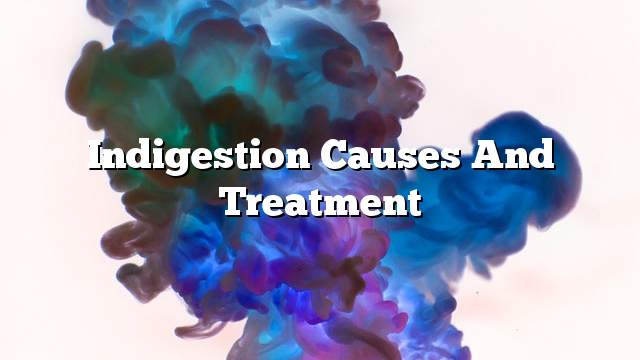Indigestion
The indigestion of medical terminology, which indicates the lack of comfort in the upper part of the abdomen, and this problem is not a disease, but a group of symptoms that appear at the time of eating or shortly after completion, and this situation varies from person to person; There are people who suffer from it on a daily basis and suffer from them in different periods.
Causes of indigestion
- Eat frying and greasy food.
- Anxiety, fatigue, stress, smoking, and alcohol abuse.
- Use of analgesics, antibiotics, and iron supplements.
- Eat drink, fast food, over-eating.
- Get plenty of caffeine in many drinks and foods such as soft drinks, coffee, and chocolates.
- Gastrointestinal diseases such as gallstones, pancreatitis, peptic ulcers, celiac disease, which is known as abdominal disease, intestinal obstruction, constipation, low blood flow to intestines, pancreatic anomalies, acid reflux, stomach cancer and esophageal ulcer.
- Sleep and lie down after eating directly.
- Note: Indigestion can occur due to unknown causes, and this type is known as non-ulcerative stomach pain, or functional indigestion.
Treatment of indigestion
- Take six to five small meals throughout the day instead of eating three large meals.
- Maintain perfect and healthy weight.
- Stay away from drinks and foods that cause indigestion, especially caffeine.
- Exercise to help digestion, get rid of excess weight.
- Learning to control anxiety, stress, and stress.
- Drug therapy is the treatment of antacid drugs, proton pump inhibitors, and antibiotics that kill bacteria that cause peptic ulcers.
Symptoms of indigestion
- The feeling of being full of annoyance for a long time, as well as the speed of feeling full when eating.
- Prone to anemia.
- The upper abdomen bulges with discomfort.
- The output of the tarp is black.
- Heat, burning or pain at the top of the abdomen in the esophagus, this may be the feeling between simple and severe.
- Nausea, and vomiting associated with blood.
- Loss of appetite plus weight loss.
- The inability to swallow or difficulty in it.
- Weakness and exhaustion.
- The sensation of stomach ache and heartburn.
- Puff, and be gases.
- Note: You should go to the emergency department immediately and visit your doctor if you experience sweating, tightness of breath, chest pain spread to the neck, jaw or arm, vomiting of blood, and swallowing.
